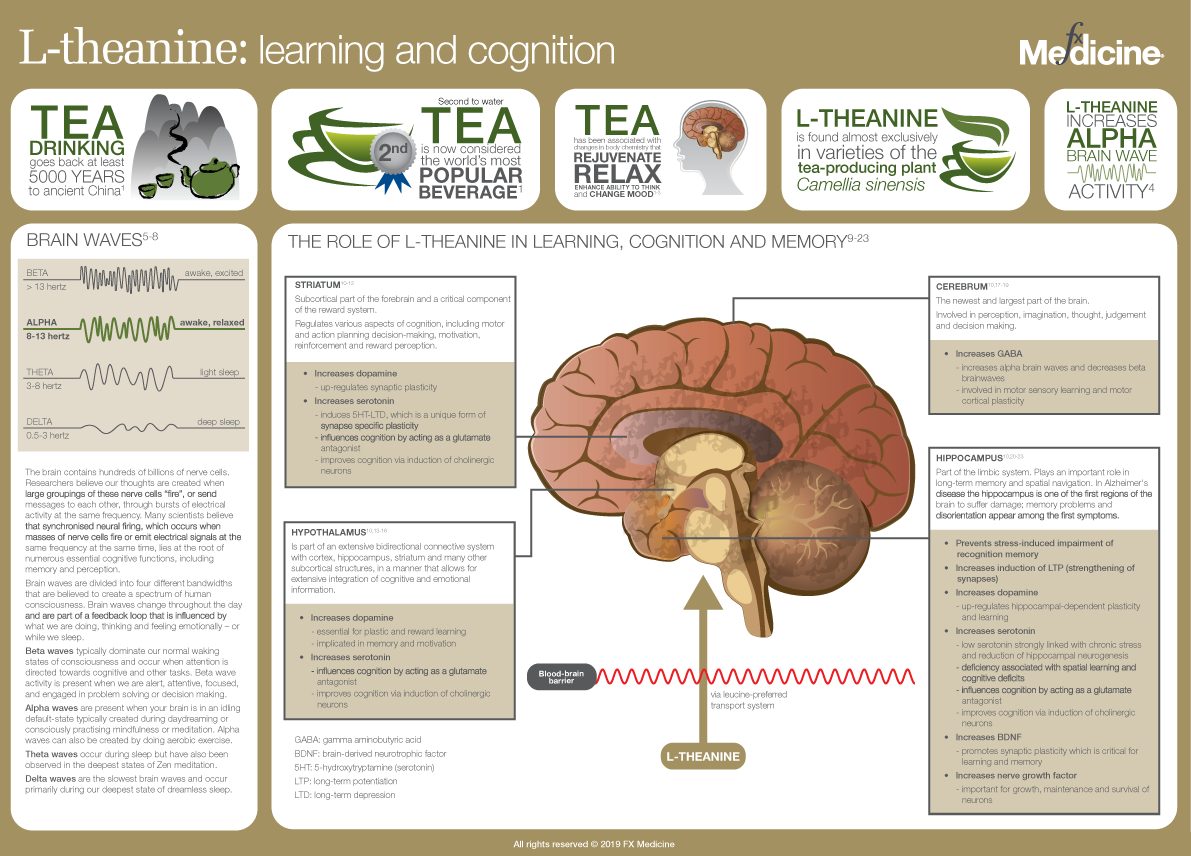
With a chemical structure very similar to glutamine, L-theanine is an amino acid with a reputation for being a relaxing agent without causing sedation.
Found mainly in green tea, multiple studies have shown L-theanine notably increases relaxation as assessed by neural measurements such as alpha waves. Animal neurochemistry studies suggest that L-theanine increases brain serotonin, dopamine and GABA levels and has affinities for several glutamate receptor subtypes. These properties may also go to explain how L-theanine exerts its neuroprotective effects. Behavioural studies in animals suggest improvement in learning and memory.
Overall, L-theanine displays a neuropharmacology suggestive of a possible neuroprotective and cognitive enhancing agent. This certainly makes it a worthwhile consideration as a supplement for learning and memory.
In this infographic we examine L-theanine as it relates to cognition, learning and focus. We also explore the areas of the brain and the specific neurotransmitters that L-theanine has been shown to influence.
references
- Braun L, Cohen M. Herbs and natural supplements: an evidence-based guide, 4th ed. Sydney: Churchill Livingstone Elsevier, 2015.
- Unno K, Takabayashi F, Kishido T, et al. Suppressive effect of green tea catechins on morphologic and functional regression of the brain in aged mice with accelerated senescence (SAMP10). Exp Gerontol 2004;39(7):1027-1034. [Abstract]
- Yokogoshi H, Kobayashi M, Mochizuki M, et al. Effect of theanine, r-glutamylethylamide, on brain monoamines and striatal dopamine release in conscious rats. Neurochem Res1998;23(5):667-673. [Abstract]
- Theanine. Natural Medicine Comprehensive Database 2015. Viewed 28 August 2015, http://www.naturaldatabase.com
- Sucholeiki R. Normal EEG waveforms. Medscape 2014. Viewed 27 August 2015, http://emedicine.medscape.com/article/1139332-overview
- Liu NH. Recognizing the degree of human attention using EEG signals from mobile sensors. Sensors 2013;13;10273-10286. [Full text]
- Lou S. Meditation and HD. HOPES 2010. Viewed 28 August 2010, http://web.stanford.edu/group/hopes/cgi-bin/hopes_test/meditation-and-hd/
- Zoefel B, Huster RJ, Herrmann CS. Neurofeedback training of the upper alpha frequency band in EEG improves cognitive performance. Neuroimage 2011;54(2):1427-1431. [Abstract]
- Gomez-Ramirez M, Higgins BA, Rycroft JA, et al. The deployment of intersensory selective attention: a high-density electrical mapping study of the effects of theanine. Clin Neuropharmacol 2007;30(1):25-38. [Abstract]
- L-theanine. Pubchem 2015. Viewed 28 August 2015, https://pubchem.ncbi.nlm.nih.gov/compound/L-Theanine
- Surmeier DJ, Shen WX, Day M, The role of dopamine in modulating the structure and function of striatal circuits. Prog Brain Res 2010;183:149-167. [Full text]
- Mathur BN, Capik, Alvarez VA. Serotonin induces long-term depression at corticostriatal synapses. J Neurosci 2011;31(20):7402-7411. [Full text]
- Pessoa L. Emergent processes in cognitive-emotional interactions. Dialogues Clin Neurosci 2010;12(4):433-448. [Full text]
- Beaulieu JM, Gainetdinov RR. The physiology, signaling, and pharmacology of dopamine receptors. Pharmacol Rev 2011;63(1):182-217. [Full text]
- Wise RA. Dopamine, learning and motivation. Nature Reviews Neuroscience 2004;5,483-494. [Abstract]
- McIntyre RS, Cha DS, Soczynska JK. Cognition in major depressive disorder. OUP: Oxford, 2013.
- Kimura R, Murata T. Influence of alkylamides of glutamic acid and related compounds on the central nervous system. Central depressant effect of theanine. Chem Pharm Bull (Tokyo) 1971;19(6):1257-1261.
- Stagg CJ, Bachtiar V, Johansen-Berg H. The role of GABA in human motor learning. Curr Biol 2011;21(6):480-484. [Full text]
- Abdou AM, Higashiguchi S, Horie K, et al. Relaxation and immunity enhancement effects of gamma-aminobutyric acid (GABA) administration in humans. Biofactors 2006;26(3):201-208. [Abstract]
- Tamano H, Fukura K, Suzuki M, et al. Advantageous effect of theanine intake on cognition. Nutr Neurosci 2014;17(6):279-283. [Abstract]
- Mahar I, Bambico FR, Mechawar N, et al. Stress, serotonin, and hippocampal neurogenesis in relation to depression and antidepressant effects. Neurosci Biobehav Rev 2014;38:173-192. [Abstract]
- Rocchetti J, Isingrini E, Dal Bo G, et al. Presynaptic D2 dopamine receptors control long-term depression expression and memory processes in the temporal hippocampus. Biol Psychiatry 2015;77(6):513-525. [Abstract]
- Richter-Levin G, Segal M. Serotonin, aging and cognitive functions of the hippocampus. Rev Neurosci 1996;7(2):103-113. [Abstract]
This image by FX Medicine is licensed under a Creative Commons Attribution-NonCommercial-NoDerivatives 4.0 International License.
More information about how to share/use the infographics for personal use.
If you interested in using any FX Medicine content for commercial use please contact us.
DISCLAIMER:
The information provided on FX Medicine is for educational and informational purposes only. The information provided on this site is not, nor is it intended to be, a substitute for professional advice or care. Please seek the advice of a qualified health care professional in the event something you have read here raises questions or concerns regarding your health.




